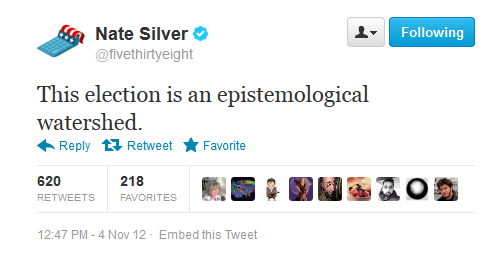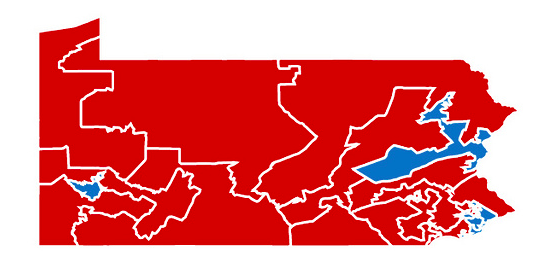
I count at least four separate delusions were repudiated by the election results on Tuesday.
1. There is a hidden conservative movement waiting to show itself
For four years, the GOP has done nothing but attack the president. This by itself is not a bad thing: the opposition party is there to check the in-party's power and moderate its policies. But as the saying goes "you are entitled to your own opinions, but not your own facts", and Republicans have existed in a space with a separate group of facts for four years. These facts: Obama's election was a fluke that Americans regret; the 2010 midterm election was a sign of impending Democrat doom; Obama is a socialist, Kenyan, racist, weak, criminal nincompoop who can't talk without a teleprompter, and the country will reject him by a large margin.
The result of these made-up facts was a delusional party who insisted that all the polling data must be wrong, that Obama would lose the popular vote by several points, and that Romney would win over 300 electoral votes. This belief became so entrenched that nominal conservative intellectuals like Jay Cost and Jennifer Rubin actually were denying the Central Limit theorem, which says that a very large sampling of a distribution has the mean of the population and small standard deviation. It's a fundamental theorem in probability and statistics, a rigorously provable fact. But there they were, arguing that aggregating polls is "junk".
In fact, the aggregate of polls was right on the money. Fivethirtyeight's Nate Silver caught flack for weeks from conservatives. but his electoral college predictions were basically perfect. Even Gallup, which had some ludicrously large swings, ended up in the neighborhood of correct. The worst pollsters? Republican leaning organizations like Rasmussen. The conservative bubble extended so far as to include pollsters.
2. Voters are morons
There seems to be the idea that voters just can't seem to sort things out. People think that they are infinitely swayable by advertisement, that they are myopic and have bad long-term memory. That they are incapable of sophistication.
But none of that proved to be true in this vote. The people recognized, according to exit polls, that it was Bush who is responsible for this depression, and that Obama stabilized an economy in free fall. They didn't fall for the "are you better off than you were 4 years ago?", recognizing that Obama's policies weren't in place until after the collapse.
The people also didn't buy into Romney's facile claims about revenue-neutral tax cuts and unspecified secret plans to create 12 million jobs. They didn't buy that Jeep was outsourcing jobs to China. They didn't believe, as he claimed, that Romney called for exactly what Obama did with the auto bailout, instead rightly recognizing that he was calling for liquidation. Voters showed that at least a majority of them can spot a dubious claim, no matter how many times it's repeated on TV.
3. Mitt Romney is a smart manager
The aftermath of the election showed that Romney, rather than the clear-seeing, pragmatic wonk he portrayed himself as, was just as much an occupant of the conservative intellect vacuum as anyone else on the right. Romney and his campaign were reportedly shocked at the election result, but most bookmakers, pundits, and analysts were saying he was going to lose. Romney reportedly was so confident he would win that he only prepared a victory speech, forcing him to delay coming out to concede so he could compose a speech.
Romney's campaign also was mismanaged badly, and nothing shows this as vividly as the debacle that was ORCA , Romney's get-out-the-vote effort. Workers reported that they were not given proper credentials to monitor polling stations, given incomplete or wrong lists of voter rolls, and expected to print the rolls on their own printers. Their website for accessing information didn't redirect http to https, instead just showing people a blank page if they omitted the 's'. The campaign repeatedly referred to ORCA as an 'app', when in fact it was just a website, creating confusion as workers tried to find the app on the iTunes and Android stores. And the website reportedly crashed from lack of redundancy, a question of which was ignored when asked (see link above).
Mitt Romney ran for president for 7 years. In that time he should have seen and evaluated every GOTV method and polling methodology on the planet. And in all that time he never put together the information he needed to run a competent campaign, nor to hire people to help him with it. This just doesn't look like a very smart businessman; it looks like the rich kid went for the big title and couldn't hack it.
4. Money is going to end all political justice
Since Citizens United, the left has lived in perpetual fear of SuperPACs, unaffiliated political organizations that raise and spend huge amounts of money without restriction or disclosure. These PACs, the most prominent run by Karl Rove, spent $400M on elections nationwide, running ads for Mitt Romney's presidential campaign and for several GOP senatorial candidates.
How did they do? Horribly. You can read the record for Rove's group, which didn't make a dent. Only 1 of the senate candidates they backed won. They spent $91M opposing Obama, $4M opposing Bill Nelson in Florida, as well as roughly $1 to $2M each for the Republican senate candidates in Montana, Indiana, Wisconsin, and Virginia. All they have to show for it is a win in Nebraska, which is not exactly blue territory to begin with.
Why didn't it work? Evidently, you just can't buy someone's opinion. As some others have guessed, I believe voters recognize the effect of outside money. But besides that, bombarding people with ads just doesn't work past a certain point. SuperPACs spent about $352M by my tally, much of it on the Republican side. But the Republicans got a shellacking (one blogger has suggested the outside money may have actually hurt the GOP).
What about House seats? Didn't the GOP retain control of the House because of this money? Unlikely. Instead, that victory is mainly due to the 2010 redistricting and horribly gerrymandering:






